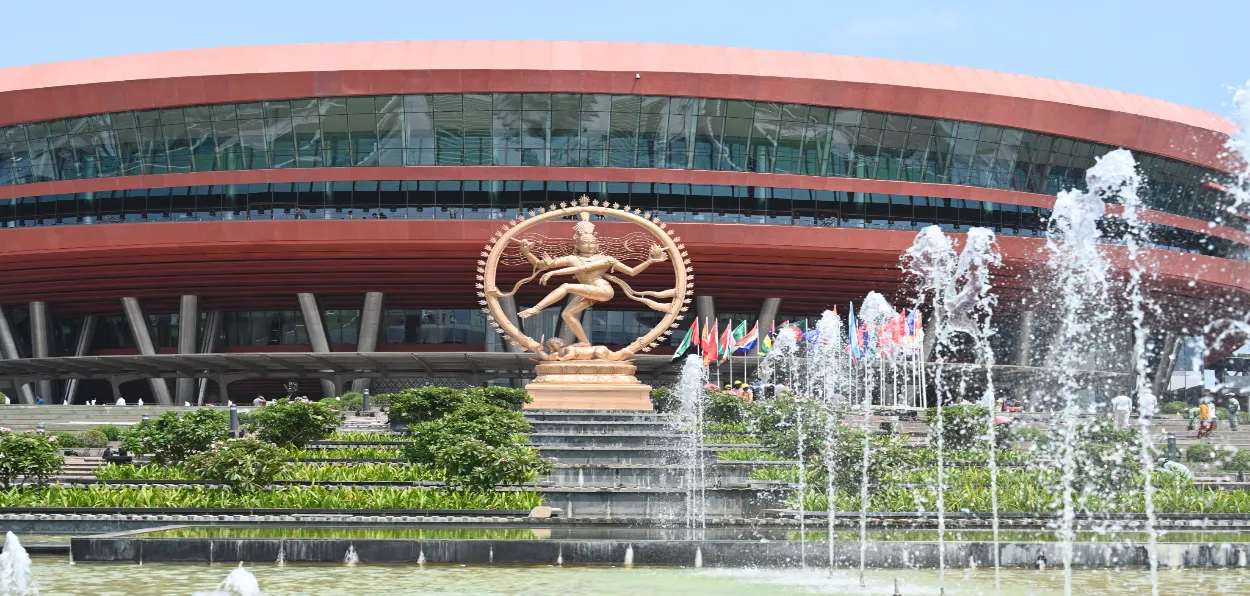
Ram Kumar Kaushik
The G20 Summit, hosted by India, has brought to the forefront an age-old concept that resonates deeply with the core values of Bharat – Vasudhaiva Kutumbakam- which translates to "the world is one family." This ancient wisdom, rooted in India's rich civilization, carries a profound message of unity, equality, and peaceful coexistence among all human beings across the globe.
In an era where geopolitical tensions and conflicts often dominate international discourse, the theme of Vasudhaiva Kutumbakam holds a mirror to our shared humanity. India's aim in emphasizing this concept on the global stage is clear: to advocate that war should neither be the first nor the last option for resolving conflicts in our interconnected world. Instead, nations must prioritize the practice of cosmopolitanism, where the well-being and harmony of the entire human family are paramount.
In the seven decades following India's independence, the concept of Vasudhaiva Kutumbakam has transcended time and space, moving from ancient scriptures to prominent international platforms like the United Nations General Assembly and the World Economic Forum. The continued global acknowledgment of this idea has the potential to unite the world as a single family, offering deeper insights into India's profound wisdom and philosophy.
India, as a civilization, signifies much more than a mere nation or government; it embodies a rich tapestry of ancient knowledge and cultural diversity. Its leadership role in the G20 is especially significant in the face of contemporary challenges such as pandemics, conflicts, climate crises, and resource constraints. Recent events have unveiled the intricacies of our diverse global landscape, emphasizing the inadequacy of one-size-fits-all solutions. India's leadership presents an opportunity to champion a more sustainable worldview, rooted in a civilization that has long embraced the entire world as a single family—Vasudhaiva Kutumbakam.
However, amidst the calls for unity and shared responsibility, a shadow of discord has emerged at the G20 Summit. China's opposition to including Vasudhaiva Kutumbakam in the official documents has sparked a debate that is worth exploring. It forces us to reflect on the relevance and urgency of embracing this ancient philosophy.
The rejection of Vasudhaiva Kutumbakam by any nation raises questions about the collective commitment to creating a world that truly reflects the values of unity and equality. In an increasingly interdependent global community, where challenges such as climate change, pandemics, and economic inequality transcend borders, the need for a common ethos that unites us is undeniable.
The concept of Vasudhaiva Kutumbakam is not a call to abandon national identities or interests. Instead, it encourages us to recognize that our destinies are intertwined, and our actions have repercussions that extend far beyond our borders. It emphasizes the importance of diplomacy, dialogue, and cooperation as the primary means of addressing global issues.
Furthermore, the philosophy of Vasudhaiva Kutumbakam aligns with India's core civilizational principles, including Satya (truth), Ahimsa (non-violence), Asteya (non-stealing), and Aparigraha (non-possessiveness).
ALSO READ: Why did PM Modi leave for Jakarta to attend ASEAN meetings amid G-20 preparation in Delhi?
The G20 Summit may have exposed differences in interpretation, but it also offers an opportunity for meaningful dialogue and reflection. It is a chance for nations to come together, bridge divides, and reaffirm their commitment to the idea that the world is, indeed, one family. In doing so, we can pave the way for a more peaceful, equitable, and prosperous future for all of humanity. Vasudhaiva Kutumbakam is not just an ancient concept; it is a call to action for our modern world.
Ram Kumar is a New Delhi-based senior Journalist
